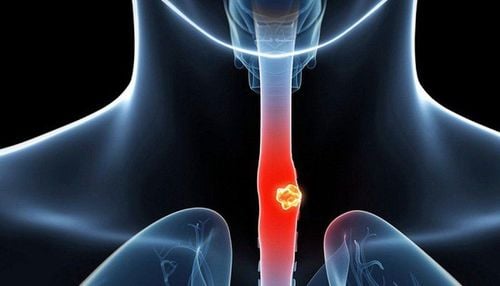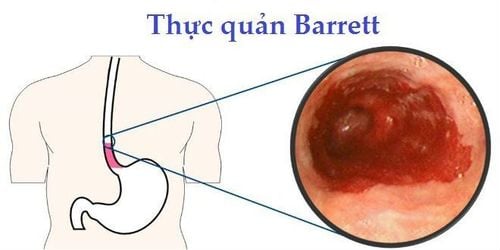This is an automatically translated article.
Post by Master, Doctor Mai Vien Phuong - Gastroenterologist - Department of Medical Examination & Internal Medicine - Vinmec Central Park International General Hospital.
The literature on artificial intelligence in the diagnosis of early esophageal cancer is gradually increasing, but with the exception of a few, they basically discuss artificial intelligence algorithms and clinical validation. The training and verification data used are also static images.
1. Limitations of artificial intelligence in early diagnosis of esophageal cancer
Clinical application of artificial intelligence in early esophageal cancer is still in its infancy. The majority of studies are retrospective and only two clinical trials have been reported, one of which is still under investigation. The aforementioned studies mainly focused on artificial intelligence algorithms, training and verification as well as comparison with detection accuracy, SEN and SPE of different levels of endoscopists. There has not been a large-scale clinical application of artificial intelligence in, either for monitoring or detection. It can be foreseen that the difficulties in applying artificial intelligence in medicine to clinical practice are very large and there are many obstacles before large-scale implementation.
First of all, today's artificial intelligence applications are mainly focused on files such as images and videos. Building an artificial intelligence model requires a sufficiently large training set that is labeled by experts for AI learning. This training requires the participation of a number of expert level staff and experts are clearly scarce resources, so the quantity and quality of training is difficult to meet the demand. However, experts are also capable of making mistakes. This can lead to incorrect diagnostic information in the training set.
Second, a large amount of medical imaging data, especially endoscopic data related to esophageal cancer, should be obtained during manual examination. The quality of the data depends not only on the qualifications of the endoscopist, but also on the function of the endoscopic instrument. Not all endoscopists can complete a qualified endoscopy, and not all endoscopes can provide the best images. Most medical institutions can only use their own data, which can be seen as a selection bias. Artificial intelligence must be applied to the external multi-centre for authentication to discover its accuracy. Currently, only one multicenter study from China has conducted external verification.
Third, the topic of using artificial intelligence in early esophageal cancer detection is mainly focused on retrospective research. It is difficult to use AI technology for potential clinical research, especially in blind randomized controlled trials, even though this type of research is the most trusted "gold standard" in clinical science. medical school. To conduct such a trial, it requires ethical approval.
Fourth, the current generation of artificial intelligence in healthcare is many but all are proprietary. The cost of equipment and people training may become a limiting factor for widespread deployment.
Fifth, there should be acceptance and approval of artificial intelligence by government and professional organizations. For each country, any regulatory issues related to the use of artificial intelligence in endoscopes must be resolved before widespread deployment.

2. The prospect of artificial intelligence application in detecting early-stage esophageal cancer
The literature on artificial intelligence in the diagnosis of early esophageal cancer is gradually increasing, but with the exception of a few, they basically discuss artificial intelligence algorithms and clinical validation. The training and verification data used are also static images.
In the study of esophageal adenocarcinoma, the authors also used static images for real-time analysis during endoscopy, which can be useful for the evaluation of esophageal adenocarcinoma and other esophageal adenocarcinomas. other situations because the extent of Barrett's esophagus is limited. It is more useful to use real-time video for detection, as detection can be done immediately without needing to take frequent pictures. To see if artificial intelligence is helpful in preventing missed cancer diagnoses, authentic video should not be limited to slow observation videos but include fast videos. However, this high precision comes from high resolution videos and it is not easy to provide accurate, high quality images in low resolution videos. To ensure computing speed, improvements to the graphics processor and other hardware need to be synchronized. The existing literature discusses the static images of the esophageal surface and the depth of invasion, indicating that the endoscopic device can not only improve image quality, but also become three-dimensional. When combined with other sensor technologies, it is desirable to perform three-dimensional mapping of esophageal lesions through endoscopy.
The artificial intelligence system is expected to become a qualified "assistant", but not a substitute for inexperienced endoscopists with the same judgment as experts. To establish a worldwide AI training database, it is necessary to establish a gold standard for AI diagnostics. This requires endoscopic specialists from different countries and regions to accurately label and supplement the database. Although AI is useful for diagnostics during endoscopy, it is temporarily difficult for AI to perform endoscopic operations on behalf of humans because the shape of the digestive tract varies from person to person. . Therefore, for endoscopists, efforts to improve the technology used to operate endoscopes will continue to be inevitable.
As the diagnostic ability and accuracy of early esophageal cancer varies among endoscopists, artificial intelligence may have better diagnostic capabilities and will help endoscopists to reduce missed early diagnosis of esophageal cancer in the near future.
Please dial HOTLINE for more information or register for an appointment HERE. Download MyVinmec app to make appointments faster and to manage your bookings easily.
References:Liu Y. Artificial intelligence-assisted endoscopic detection of esophageal neoplasia in early stage: The next step? World J Gastroenterol 2021; 27(14): 1392-1405 [DOI: 10.3748/wjg.v27.i14.1392]. Thrumurthy SG, Chaudry MA, Thrumurthy SSD, Mughal M. Esophageal cancer: risks, prevention and diagnosis. BMJ . Year 2019; 366: l4373. [ PubMed ] [ DOI ] Liu Y. Artificial intelligence-assisted endoscopic detection of esophageal neoplasia in early stage: The next step? World J Gastroenterol 2021; 27(14): 1392-1405 [DOI: 10.3748/wjg.v27.i14.1392]














